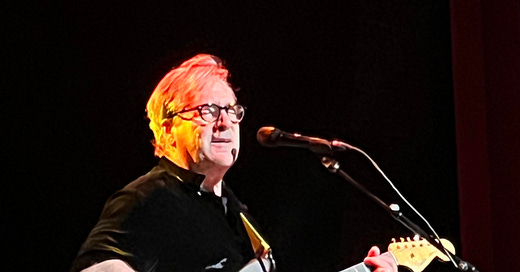Concert Review: Richard Shindell Captivates Avalon Audience
Originally Published in the Talbot Spy
Writers write what they know, and Richard Shindell knows the road, trucks, driving, and, perhaps most of all, how the ebb and flow of daily life shapes us. A regular visitor to the Avalon, Shindell returned last week, bringing his poignant observations and sharp wit to an appreciative audience.
The show, initially slated for the more intimate Stoltz Listening Room, quickly sold out, necessitating a move to the larger theater. This space was thoughtfully arranged in a cabaret style, successfully maintaining a sense of intimacy that suited Shindell’s performance.
Shindell is a distinctive voice in contemporary folk music, known for his intricate narratives and keen eye for detail. His songs are not passive background noise; they are carefully crafted stories that demand, and reward, your attention. Shindell has a sly way of transforming the mundane into moments of profound insight.
He shared that driving is one of his major themes. This focus puts him in the company of many musicians who make their living on the road, yet it also sets him apart. While countless songwriters pen tunes about life on the road—from Bob Seger’s classic “Turn the Page” to Christina Vale’s more recent “Getting High in Hotel Rooms”—Shindell often zeroes in on the actual act of driving, the quiet solitude, and the fleeting observations gleaned from the highway.
The concert opened with two truck-driving songs, starting with “The Kenworth of My Dreams.” This gave way to the weary introspection of “Deliver Me To The Next Best Western,” with its evocative lines: “I am wretched, I am tired / But the preacher is on fire / And I wish I could believe.”
Shindell’s gift for illuminating the drama in everyday life shone in “The Last Fare of the Day.” Switching to electric guitar, he transformed a simple cab ride into a poignant journey, singing: “Into the stream, we pulled away / I know it well, this old ballet / Finding the flow, minding the sway / Catching green lights all the way.” His connection with the audience was unmistakable. It never felt like he was performing his songs. He sang without artifice forging a genuine shared experience. The power of Shindell’s writing lies in its specifics, grounding his narratives with precise street names and personal touches. Throughout the evening, he worked from a well-worn notebook, underscoring the raw, unadorned authenticity of his craft.
The show peaked with the evening’s two overtly political songs, both centered on themes of immigration. In “Fishing,” an IRS agent interrogating a would-be immigrant finds an unexpected human connection over their shared past as fishermen. The stark reality in lines like, “Here’s how it works / I’ve got these faces / You give them names and I won’t deport you / Make sure you face my tape recorder,” was arresting. This was followed by “Did I Hear Wrong,” a powerful commentary on contemporary politics. Its imagery of abandoned water jugs and the poignant conclusion—”It was kindness that filled them / But hatred poured them out again”—hit hard.
Musically, Shindell’s performance was equally engaging. His nuanced guitar work, from the unique tapping technique in “Balloon Man” to his effective use of four different guitars, brought a variety of voices to the stage, ensuring that a solo performance never felt monotonous.
The latter half of the set offered a moving blend of original material and a thoughtfully chosen cover. His rendition of Scottish songwriter Karine Polwart’s “The Sun’s Coming Over the Hill” was a somber yet ultimately uplifting exploration of grief and resilience: “Oh, the nights are long / But life is longer still / Oh, the nights are long / But the sun’s comin’ over the hill.” This transitioned to the sweet, romantic “A Summer Wind, A Cotton Dress,” a love song that found hope in rekindled affection.
The timeless beauty of “Reunion Hill,” a song he penned for Joan Baez, offered a Civil War widow’s haunting perspective, with a soaring hawk symbolizing enduring love. After “There Goes Mavis” concluded the main set, Shindell returned for an encore, treating the audience to “Wysteria,” a song he confirmed was being played for the first time on this tour, with its reflective opening: “The vine of my memory / Is blooming around those eaves / But it’s true it’s a chore to tame wisteria.”
In a world often filled with noise, Richard Shindell offers a refreshing stillness, a space where keen observation meets poetic grace. He delivered a memorable evening of introspection and connection, reminding us that sometimes, the most profound insights are found in the most ordinary moments.



